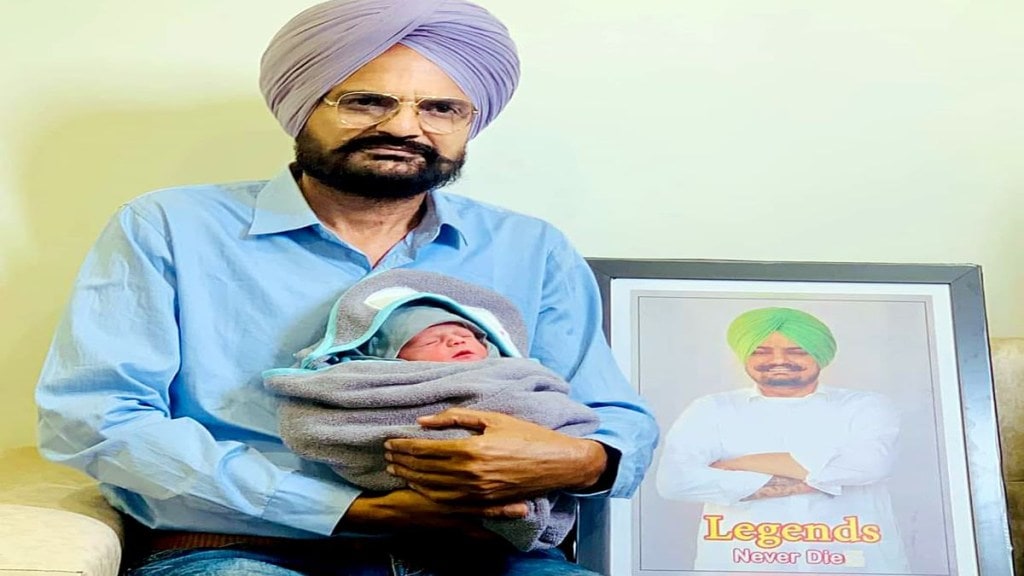Sidhu Moosewala’s parents’ IVF pregnancy: Sidhu Moosewala’s parents have welcomed a baby boy and it has sparked a controversy regarding the legal status of the newborn child. The Union Health Ministry has asked the Punjab government to submit a detailed report on the In-Vitro Fertilization (IVF) treatment undergone by Sidhu Moosewala’s mother Charan Kaur.
The couple had sought IVF to conceive their second baby nearly two years after they lost their only son, who was murdered on May 29, 2022, in Punjab’s Mansa district.
According to a report by Indian Express, the Centre wrote to the Punjab government asking how his mother, Charan Kaur, underwent IVF treatment at 58 when the age limit for assisted reproductive technology (ART) procedures is 50.
On March 14, S K Ranjan, Director, Department of Health Research under health ministry, wrote a letter to the Principal Secretary of Health, Punjab Government urging the state to investigate the matter and furnish a report in accordance with the ART (Regulation) Act, 2021.
The letter highlighted a news report indicating that Kaur underwent IVF treatment to conceive at the age of 58.
“Under… Assisted Reproductive Technology (Regulation) Act 2021, the age limit prescribed for a woman going under ART services is between 21 and 50 years. You are requested to look into the matter and submit a report to this department of the action taken in this case,” stated a letter from the health ministry.
According to Indian Express report, Moosewala’s parents had gone abroad for the IVF procedure, however, the baby was delivered in India.
On Tuesday, soon after getting a notice from the authorities, Moosewala’s father Balkaur took to social media alleging harassment from the Punjab government.
“The district administration has been harassing me since morning, asking for documents of this child. I am being asked all kinds of questions to prove that this child is legitimate. I want to make an appeal to the government, especially the Chief Minister, to let the treatment of my wife get over. I live here. Wherever you will summon me, I will come,” he said.
Dr Rajni Jindal, an IVF specialist at Jindal Heart and Infertility Institute in Bathinda, where the child was born on March 17, denied any violation of the ART Act, Indian Express reported.
“Charan Kaur had already conceived when she approached us. They sought treatment for conception outside of India, although the specific country is unclear. It was our duty to provide appropriate health services to the pregnant woman who sought our assistance. We ensured that all paperwork related to the birth of the child was devoid of any technical issues, and complied with the law,” Dr Jindal said as quoted by Indian Express.
What is the legal status of IVF in India?
Under the ART (Regulation) Act, 2021, the age restriction is based on several crucial health factors concerning the mother. As women age, the quality of their eggs diminishes, impacting the success rates of IVF. According to the experts, the risk of miscarriage rises in older which can lead to complications.
Additionally, older women face an increased likelihood of chromosomal abnormalities in embryos, raising concerns for both mother and child. Lastly, the body’s response to fertility drugs may be less effective as women age, further complicating the IVF process.
According to the law, violating provisions of the Act is punishable by a fine of Rs 5 lakh to 10 lakh for the first contravention. Subsequent contraventions can attract imprisonment between three to eight years and a fine of Rs 10 to 20 lakh.
Dr Sweta Gupta, Director, IVF and Infertility, Max Multi Speciality Center, Panchsheel Park highlighted that the ART (Regulation) Act, 2021 regulates and supervise assisted reproductive technology clinics and the assisted reproductive technology banks, to prevent misuse, to have safe and ethical practice of assisted reproductive technology services for addressing the issues of reproductive health where assisted reproductive technology is required for becoming a parent. Moreover, it also regulates freezing of gametes, embryos, embryonic tissues.
“As per rules by Indian government, the clinics shall apply the assisted reproductive technology services,— (i) to a woman above the age of twenty-one years and below the age of fifty years; (ii) to a man above the age of twenty-one years and below the age of fifty-five years. Indian women can avail treatment if she is less than 50 years of age. This is to prevent adverse risks associated with advanced maternal age like hypertension, diabetes and small babies. ART technology should be used at appropriate age after baseline health screening for good outcome in mothers and newborns. Advanced age of mother may not be good for welfare of child,” Dr. Gupta told Financial Express.com.
This law prevents misuse of assisted reproduction technology, though natural conceiving does not have any age limits she informed.
It is noteworthy that there have been petitions in the last couple of years that have challenged the upper age limit. In a case in Kerala, the state High Court had allowed the couple to continue treatment despite crossing the age limit.
“Women start having their periods around the age of 12, and they continue until menopause. The age of menopause commonly in India is around 45 to 50. Generally, a good reproductive age for women is between 20 and 40 years of age. But with the advent of IVF, it is possible to get pregnant even at a later age. However, the government of India has set certain guidelines for IVF in India, and the lower limit of the age is 20 for females and 23 for males, and the upper limit is 50 for females and 55 for males. So, this age limit is mainly because as you grow older, the eggs become older, and with older eggs, there is a higher chance of genetic anomalies and miscarriage in the pregnancy,” Dr Astha Dayal, Lead Consultant, Obstetrics & Gynaecology, CK Birla Hospital, Gurugram told Financial Express.com.
So, if the age of menopause is 50, then maybe about 10–13 years before that, the egg quality starts deteriorating.
Dr. Dayal also emphasised that it is difficult to use your own eggs after the age of 45 to get pregnant.
“If you are using donor eggs, those eggs are younger and it is easier to achieve a successful pregnancy with that. However, above the age of 50, there will be many more medical complications in pregnancy and that is why it is not recommended to try IVF after 50 years of age,” she added.
What are the exceptions under law to allow woman over 50 to opt for IVF in India?
Section 21(g)(i) of the Act essentially states that the maximum age for a woman to avail ART services is set at 50 years or at the completion of menopause, whichever occurs earlier. However, the law does have some exceptions.
As several research indicate increased incidences of health-related issues including gestational diabetes, pre-eclampsia, and multiple births, amongst other risks, which surge with advancing maternal age, the age restriction has been put in place to lower this risk factors.
However, the law also includes a clause for exceptions. A woman surpassing the age ceiling of 50 years can still opt for ART services, including IVF after a thorough medical and mental health evaluation which will certify if she is suitable and fit for the procedures.
So, women above 50 years of age may opt for IVF in India if they fulfil the stipulated medical and mental health criteria.
Under normal circumstances, the Act clearly restricts services to persons aged between 23 and 50 years for women and from 26 to 55 years for men. However, an essential caveat is section 21(g)(i) which paves the way for exceptions, thereby expanding access to ART services, specifically, IVF.
Women above the age of 50 years who want to opt for IVF need to undergo a comprehensive health check-up encompassing physical, cardiovascular and gynaecological health is mandatory. Any underlying health conditions or potential risk factors have to be thoroughly evaluated and deemed manageable by a registered medical practitioner, the law states.
Additionally, the woman must provide insurance cover for the unborn child. Moreover, a clear plan regarding the guardianship of the child in case of any unfortunate eventuality is required.
While the Assisted Reproductive Technology (Regulation) Act, 2021 imposes age-specific restrictions on the availing of ART services, it also incorporates exceptions under section 21(g)(i).







